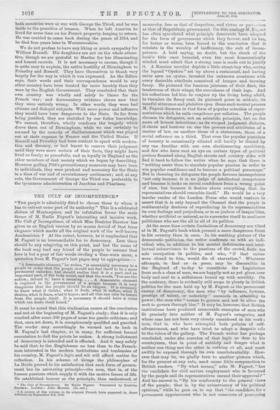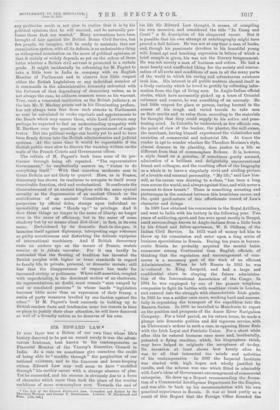THE CULT OF INCOMPETENCE.* "THE people is admirably fitted to
choose those to whom it has to entrust some part of its authority." This is a celebrated dictum of Monteequieu, and its refutation forms the main theme of M. Emile Faguet's interesting and incisive work, The Cult of Incompetence, of which Miss Beatrice Barstow has
given MI an English version by no means devoid of that terse elegance which marks all the original work of the well-known
Academician. At the outset, however, be it emphasized that M. Faguet is no irreconcilable foe to democracy. Lest there should be any misgiving on this point, and lest the name of the book may lead any friend of the people to assume that here is but a posy of fair words circling a time-worn sneer, a quotation from M. Faguet's last pages may be appropriate :—
"A democratic element," he writes, "is essentially necessary to a people in order that the people should not feel itself to be a more permanent onlooker, but should realize that it is a part, and an important part, of the body social, and that the words, 'You are the nation ; defend it, have a meaning. . . . A democratic element is required in the government of a people because it is very dangerous that the people should be an enigma. It is necessary to know what it thinks, what it feels, what it suffers, what it desires, what it fears, what it hopes; and all this can only be learnt from the people itself. It is necessary it should have a voice which can make itself hoard."
It must be noted that this vindication comes at the conclusion and not at the beginning of M. Faguet's study; that it is only reached after some 200 pages of none too gentle criticism; and that, once set down, it is conspicuously qualified and guarded. The reader may accordingly be warned not to look in H. Faguet's last chapter, a3 in many, for sufficient formal recantation to dull the points lie makes. A strong indictment of democracy is intended and is effected. And it may safely be said that, to the Englishman no less than to the French- man interested in the modern institutions and tendencies of his country, M. Faguet's logic and wit will afford matter for reflection. In his scheme of things the philosopher of La BrAde proved to his satisfaction that each form of govern- ment has its animating principle—the sum, that is, of the human passions which supply it with the motive forces of life. He established honour as the principle, thus understood, of
• The Cult of Incompetence. By Emile Pagnet. Translated by Beatrice Barstow. London John Murray. [5s. not.]
t A review of thin volume in its original French form appeased in these columns on September 3111, 1910.
monarchy, fear as that of despotism, and virtue or patr;otistn as that of Republican government. On this analogy M. Fiiguet has often speculated what principle democrats have adopted for the form of government which they favour, and he has, for better or 'worse, been forced to the conclusion that it consists in the worship of inefficiency, the cult of incom- petence. A bold saying, no doubt, but the shock of the book's title once breasted, even the most democratically minded must admit that a strong case is made out to justify it. A Russian novelist depicts a little street-boy who, seeing the legend "Oysters" set up above a restaurant, and having never seen an oyster, invested the unknown creatures with every desirable attribute conceived of hunger and teeming fancy. He pictured the luscious juiciness of their flesh, the tenderness of their wings, the succulence of their legs. And his reflections led him to conjure up the living being afield, to visualize its fleecy coat, its pinioned poise in mid-air, its tuneful utterance and plaintive eyes. Some such mental process M. Faguet discerns in that form of popular selection of repre- sentatives which he calls competence par collation. The people chooses its delegates, not on scientific principle, but on the score of honest intentions ; as its warped judgment dictates, it elects and bestows on one the powers and attributes of a, master of law, on another those of a statesman, those of a social reformer on a third. That even the popular postulate of honesty is occasionally vitiated will hardly be denied by any one familiar with our own electioneering machinery, and few who have cast an eye on certain types of political posters flaunted along English streets and country sides will find it hard to follow the writer when he says that there is "nothing easier than to simulate popular passion in order to win popular confidence and to become a political personage." But in choosing its delegates the people favours incompetence "not only because it is no judge of intellectual competence and because it looks on moral confidence from a wrong point of view, but because it desires above everything that its representatives should resemble itself." He would be a very insular reader of the London Press who would venture to assert that it is only beyond the Channel that the people is sentimentally desirous of reproducing in its representatives its own feelings and prejudices, or is so jealous of inequalities, whether artificial or natural, as to surrender itself to mediocre politicians who are the all in all of its politics.
At the same time certain limitations of democracy are tilted at in M. Faguet's book which present a more dangerous front in his country than in ours. In his scathing picture of the democratic politician, the writer confronts us with an indi- vidual who, in addition to his mental deficiencies and intel- lectual subservience to the passions of the crowd, finds his sole occupation in politics, and who, "if that career were closed to him, would die of starvation." Whatever attempts, in fact or in posse, may be discernible in the England of to-day to constitute the Legislature from such a class of men, we are happily not as yet given over body and soul to a selfishness bound up with servility. On the contrary, there is evidently still scope in plenty in British politics for the man held up by M. Faguet as the paramount enemy of democracy, the man who "by influence, fortune, prestige of talent, or notoriety" succeeds in attaining to power; the man who "means to govern and not to allow the mob to govern through him." It may be, however, that British institutions have produced memorable examples of men who fit precisely into neither of M. Faguet's categories, and whose case has not been very closely considered in his work ; men, that is, who have attempted both policies of self- advancement, and who have tried to adapt a despotic role to the voices of the gallery. The French writer has perhaps concluded, under 4he coercion of that logic so dear to his countrymen, that in point of subtlety and danger what is neither one thing nor the other is nothing at all, and must swiftly be exposed through its own unsubstantiality. How- ever that may be, we gladly turn to another picture which, for the present at any rate, need cause little compunction to British readers. "By what means," asks M. Faguet, "has the candidate for civil service employment who is favoured by the people and its representatives earned their approval P" And his answer is, "By his conformity to the general views of the people; that is, by the subserviency of his political opinions," while he goes on to say that "the candidate for a permanent appointment who is not conscious of possessing any particular merit is not slow to realize that it is by his political opinions that he will succeed, and he naturally pro- fesses those that are wanted." Many accusations have been brought of late against the British Home Civil Service, but few people, we imagine, will be ready to maintain that our examination system, with all its defects, is as undesirable a thing as widespread nomination on the score of political opinions, or that it mainly ch widely depends as yet on the colour of these latter whether a British civil servant is promoted to a certain grade. It might incidentally be refreshing for M. Faguet to take a little tour in India in company with an English Member of Parliament and to observe how little respect either the British Legislature or any individual member of it commands in the administrative hierarchy entrusted with the fortunes of that dependency of democracy unless, as is not always the case, he adduces common sense as his warrant. True, such a venerated institution as the British judiciary, as the late Mr. T. Mackay points out in his illuminating preface, has not always been free from such attacks in Parliament as may be calculated to evoke reprisals and appointments to the Bench which may ensure them, while Lord Loreburn may perhaps be expected to feel an understanding sympathy with IL Bat-thou over the question of the appointment of magis- trates. But the political wedge can hardly yet be said to have been firmly driven into the British administrative and judicial systems. At the same time it would be regrettable if the British public were slow to discern the warning written on the walls of the French Courts and Government offices.
The refrain of M. Faguet's book loses none of its per- tinence through being oft repeated. "The representative Government," he emphatically assures us, "wishes to do everything itself." With that assertion moderate men in Great Britain are not likely to quarrel. Here, as in France, democracy has shown its readiness to arrogate to itself every conceivable function, civil and ecclesiastical It confronts the dismemberment of an ancient kingdom with the same cynical serenity as the dispossession of an ancient Church or the stultification of an ancient Constitution. It endows ,pauperism by official doles, stamps upon individual re- sponsibility and cries "Hands up !" to privilege. And it does these things no longer in the name of liberty, no longer even in the name of efficiency, but in the name of some shadowy but by no means silent Zeit-Geist ; in fact, in its own name. Emboldened by its domestic flash-in-the-pan, it launches itself against diplomacy, interpreting sage reticence as guilty secretiveness and disturbing the delicate equipoise of international machinery. And if British democracy casts an austere eye on the mceurs of France, mutato 'tontine de te fabula narrator. For it can hardly be contended that the flouting of tradition has invested the British peoples with higher or truer standards in regard to family life, to private, personal, or domestic morals ; still less that the disappearance of respect has made for increased civility or politeness. Where self-assertion, coupled with superficiality, is the dominant motive of an electorate, its representatives, no doubt, must remain "men swayed by real or simulated passions" in whose hands "legislation becomes little more than an expression of their frenzy, a series of party measures levelled by one faction against the other," If M. Fagnet's book succeeds in holding up to British readers facts and tendencies none too remote in time or place to justify their close attention, he will have deserved as well of a friendly nation as he deserves of his own.























































 Previous page
Previous page